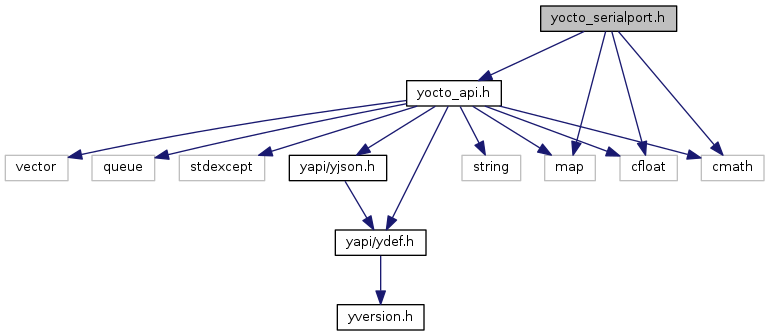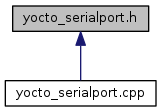

Go to the source code of this file.
Classes | |
| class | YSerialPort |
| class | YSnoopingRecord |
Macros | |
| #define | _Y_VOLTAGELEVEL_ENUM |
| #define | Y_COMMAND_INVALID (YAPI_INVALID_STRING) |
| #define | Y_CURRENTJOB_INVALID (YAPI_INVALID_STRING) |
| #define | Y_ERRCOUNT_INVALID (YAPI_INVALID_UINT) |
| #define | Y_LASTMSG_INVALID (YAPI_INVALID_STRING) |
| #define | Y_PROTOCOL_INVALID (YAPI_INVALID_STRING) |
| #define | Y_RXCOUNT_INVALID (YAPI_INVALID_UINT) |
| #define | Y_RXMSGCOUNT_INVALID (YAPI_INVALID_UINT) |
| #define | Y_SERIALMODE_INVALID (YAPI_INVALID_STRING) |
| #define | Y_STARTUPJOB_INVALID (YAPI_INVALID_STRING) |
| #define | Y_TXCOUNT_INVALID (YAPI_INVALID_UINT) |
| #define | Y_TXMSGCOUNT_INVALID (YAPI_INVALID_UINT) |
Typedefs | |
| typedef void(* | YSerialPortValueCallback) (YSerialPort *func, const string &functionValue) |
Enumerations | |
| enum | Y_VOLTAGELEVEL_enum { Y_VOLTAGELEVEL_OFF = 0, Y_VOLTAGELEVEL_TTL3V = 1, Y_VOLTAGELEVEL_TTL3VR = 2, Y_VOLTAGELEVEL_TTL5V = 3, Y_VOLTAGELEVEL_TTL5VR = 4, Y_VOLTAGELEVEL_RS232 = 5, Y_VOLTAGELEVEL_RS485 = 6, Y_VOLTAGELEVEL_INVALID = -1, Y_VOLTAGELEVEL_OFF = 0, Y_VOLTAGELEVEL_TTL3V = 1, Y_VOLTAGELEVEL_TTL3VR = 2, Y_VOLTAGELEVEL_TTL5V = 3, Y_VOLTAGELEVEL_TTL5VR = 4, Y_VOLTAGELEVEL_RS232 = 5, Y_VOLTAGELEVEL_RS485 = 6, Y_VOLTAGELEVEL_INVALID = -1 } |
Functions | |
| YSerialPort * | yFindSerialPort (const string &func) |
| YSerialPort * | yFirstSerialPort (void) |
Macro Definition Documentation
| #define _Y_VOLTAGELEVEL_ENUM |
Definition at line 56 of file yocto_serialport.h.
| #define Y_COMMAND_INVALID (YAPI_INVALID_STRING) |
Definition at line 76 of file yocto_serialport.h.
| #define Y_CURRENTJOB_INVALID (YAPI_INVALID_STRING) |
Definition at line 74 of file yocto_serialport.h.
| #define Y_ERRCOUNT_INVALID (YAPI_INVALID_UINT) |
Definition at line 70 of file yocto_serialport.h.
| #define Y_LASTMSG_INVALID (YAPI_INVALID_STRING) |
Definition at line 73 of file yocto_serialport.h.
| #define Y_PROTOCOL_INVALID (YAPI_INVALID_STRING) |
Definition at line 77 of file yocto_serialport.h.
| #define Y_RXCOUNT_INVALID (YAPI_INVALID_UINT) |
Definition at line 68 of file yocto_serialport.h.
| #define Y_RXMSGCOUNT_INVALID (YAPI_INVALID_UINT) |
Definition at line 71 of file yocto_serialport.h.
| #define Y_SERIALMODE_INVALID (YAPI_INVALID_STRING) |
Definition at line 78 of file yocto_serialport.h.
| #define Y_STARTUPJOB_INVALID (YAPI_INVALID_STRING) |
Definition at line 75 of file yocto_serialport.h.
| #define Y_TXCOUNT_INVALID (YAPI_INVALID_UINT) |
Definition at line 69 of file yocto_serialport.h.
| #define Y_TXMSGCOUNT_INVALID (YAPI_INVALID_UINT) |
Definition at line 72 of file yocto_serialport.h.
Typedef Documentation
| typedef void(* YSerialPortValueCallback) (YSerialPort *func, const string &functionValue) |
Definition at line 54 of file yocto_serialport.h.
Enumeration Type Documentation
| enum Y_VOLTAGELEVEL_enum |
Definition at line 57 of file yocto_serialport.h.
Function Documentation
|
inline |
Retrieves a serial port for a given identifier. The identifier can be specified using several formats:
- FunctionLogicalName
- ModuleSerialNumber.FunctionIdentifier
- ModuleSerialNumber.FunctionLogicalName
- ModuleLogicalName.FunctionIdentifier
- ModuleLogicalName.FunctionLogicalName
This function does not require that the serial port is online at the time it is invoked. The returned object is nevertheless valid. Use the method YSerialPort.isOnline() to test if the serial port is indeed online at a given time. In case of ambiguity when looking for a serial port by logical name, no error is notified: the first instance found is returned. The search is performed first by hardware name, then by logical name.
If a call to this object's is_online() method returns FALSE although you are certain that the matching device is plugged, make sure that you did call registerHub() at application initialization time.
- Parameters
-
func : a string that uniquely characterizes the serial port
- Returns
- a YSerialPort object allowing you to drive the serial port.
Definition at line 993 of file yocto_serialport.h.
|
inline |
Starts the enumeration of serial ports currently accessible. Use the method YSerialPort.nextSerialPort() to iterate on next serial ports.
- Returns
- a pointer to a YSerialPort object, corresponding to the first serial port currently online, or a NULL pointer if there are none.
Definition at line 1004 of file yocto_serialport.h.